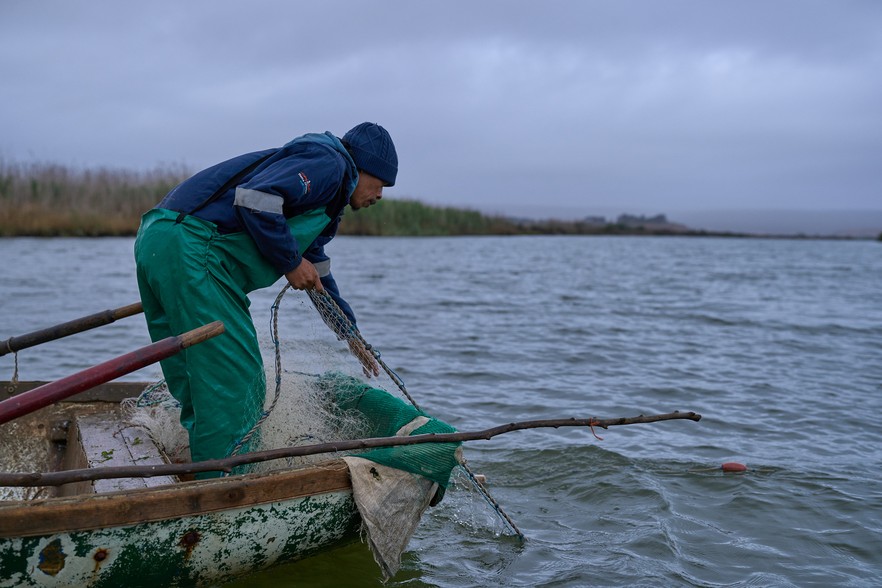
10 November 2025
Salvester Don pulls in his net on the Olifants River. No fish were caught that morning. Photos: Barry Christianson.
Every day, when conditions allow, little wooden boats, called bakkies, move up and down the Olifants River. The bakkies usually have two occupants. One lifts a weighted, two-metre wooden pole with a 35 to 45 metre drift net attached to it, and drops it in the water. The other occupant, rows away, unfurling the net. Next, they either drift with the current or anchor themselves to the riverbank.
The drift net mesh size targets South African mullet known as harders.
Don has been a full time fisher since 1996, and is the current chairperson of Ebenhaeser small-scale fishing cooperative.
The forebears of today’s Ebenhaeser residents settled here after being displaced from the Lutzville area in 1925. They were farmers and also fishers.
Salvester Don, a fourth generation fisher, began to fish full time in 1996. Through the 2000s, he was involved in the fight for small-scale fisher rights, and today he is the chairperson of Ebenhaeser’s small-scale fishing cooperative.
Like the rest of the cooperatives on the West Coast, Ebenhaeser receives an annual allocation of the high value rock lobster, which they catch in Elands Bay.
But Don feels that harder fishing carries greater importance to the Ebenhaeser community.
“It’s the cheapest food. If you have ten harders and a loaf of bread, you can braai the fish and have a nice meal”, he says.
Don sorts the fish he caught the night before. The smallest fish get salted and preserved to make dried bokkoms. The larger fish get sold at R3 a fish.
Certain weather conditions aren’t conducive to catching harders. “We believe that when the east wind blows for a few days [and then] stops, there will be fish. But when it’s cloudy or rainy, the fish swim deeper, and because our nets are only two-metres deep, the fish swim under the nets”, he says.
On mornings that are not good for fishing, because of the weather or the tide, fishers tend to walk the banks anyway. “It’s not just fishing for us. In the mornings when there is no wind, the river is peaceful. You see the birds and the otters, and it calms your mind”, says Don.
Children play with spinning tops outside of Don’s home. The Olifants River meanders in the background.
Some fishers will go out to drop their nets even when conditions aren’t favourable. The river is visible from many of the homes in Ebenhaeser. When people see someone pulling up their net with fish, they also go fishing. They eat the fish they catch at home or sell it for income.
“Fishing is like an adventure for a fisher. When a fisher gets a fish in his net, it’s like he goes mad, and he just wants to catch more,” says Don.
From left: Wilbur Cloete, Rhiaan Coetzee and Don chat at the banks of the Olifants River. Coetzee sits in his boat which first belonged to his late father. “This is my history,” he says.
Don and a few other cooperative members spend much time dealing with the Department of Forestry, Fisheries and Environment (DFFE), South African Maritime Safety Authority( SAMSA), and the Companies and Intellectual Properties Commission. They must make sure their permits are in order, their boats are seaworthy, and the necessary paperwork for their cooperative is in order.
The cooperative plans to make Ebenhaeser the hub for harder fishing in their area, and are exploring ways of processing the fish in the village before selling it and cutting out the middle men.
“If people want to buy harders they must come to us,” says Don.
Don adds the bigger fish to a crate after rinsing them. The fish in the crate was to be sold as one batch.
With his responsibilities for the cooperative, Don doesn’t get to experience the adventure of fishing as much as he would like. His son, Stewart, has taken over fishing duties. Seeing him develop as a fisher makes Don proud.
“Other fishers tell me that they can see how good he is getting. It’s because of how I taught him”, he says, smiling proudly.
A village cat runs away with a harder that Don gave it.